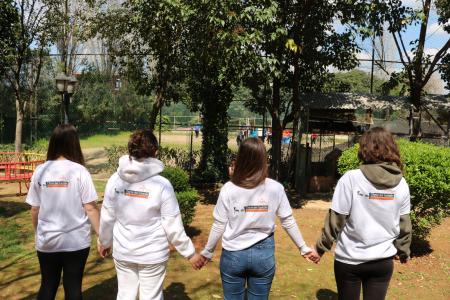TeamUp is a group movement-based intervention aimed at strengthening the emotional resilience of children.
![]()
Background
TeamUp has been developed by War Child Holland, Save the Children and UNICEF in the Netherlands, together with their implementation partners, for children who are living in a war context. The intervention was then implemented with success in shelters, schools, in daily care and in alternative care centres.
TeamUp strives to increase children’s wellbeing by establishing a sense of security, promoting social connectedness, increasing self-regulation, and fostering a positive outlook on life.
Context
In the actual situation, when thousands of families have fled from Ukraine and settled down in the neighbouring countries, children and young people are facing severe causes of distress in foreign countries. Therefore, the so-called WELL-U project co-funded by the EU and SOS Villaggi dei Bambini Italia had set the aim to implement the TeamUp intervention, which is highly adaptable in terms of contexts and culture, to support the emotional well-being of children and young people, and their relationship with their peers and their caring adults.
Goals and target groups
TeamUp is suitable for all children and adolescents aged 6-17. By offering support to all children no matter their level of distress, TeamUp acts at the promotion/universal prevention ladder of the MHPSS interventions pyramid.
Al least two of the core outcomes of TeamUp (i.e., social connectedness and self-regulation) are key protective factors for child abuse instances.
TeamUp can therefore be seen as a preventative measure to reduce the risks for mental health disorders and abuse. The TeamUp methodology additionally trains staff for the detection of problematic behaviour to identify those that might require further support.
Children in this situation can be referred to more specialized help and could benefit from interventions acting at higher levels of the pyramid.
Theoretical background
TeamUp comprises a variety of group movement-based games, sports-based activities, creative movement, and body awareness practices.
These combined activities, support children when managing their feelings.
Each activity has a specific goal related to themes such as dealing with anger, stress, and interacting with others. Its non-verbal modalities maximize inclusivity among children.
In addition, to increasing social and emotional stability and coping for its beneficiaries, TeamUp also allows for the identification of children in need of further mental health or psychosocial support.
TeamUp is being monitored and evaluated regularly through rigorous scientific procedures.
TeamUp processes in general
Weekly 1-hour long sessions are offered by a team of 3 to 5 trained facilitators. Groups of children are divided into age categories (e.g., 6-11, 12-17).
Participation is not compulsory, this “Step-in Step-out” approach allows children to participate when they like.
Qualifications
TeamUp is provided by lay facilitators having received a 4-day experiential training and supervision. TeamUp facilitators can be volunteers working in reception centres, teachers, or others working in contact with children.
Contraindications of the method
TeamUp is not a tool for diagnosing or to treat mental disorders, although it can result in more targeted referrals to specialists regarding mental health problems.
Sources
Further general information on the intervention can be found at the link.
-
The “TeamUp at home” video series and materials can be accessed here.
-
The “TeamUp mini-Gamebook for children (with illustrations)” is available in 12 languages (Arabic, Dutch, English, Farsi, French, Greek, Italian, Spanish, Swedish, Tamil, Tigrinya, and Turkish) here.
-
A video on the experiences of a TeamUp trainer can be found here.
-
Relevant references on the current implementations of TeamUp within SOS Children’s Villages can be accessed here.
-
Bleile, A. C. E., Koppenol-Gonzalez, G. V., Verreault, K., Abeling, K., Hofman, E., Vriend, W., Hasan, A., & Jordans, M. J. D. (2021). Process evaluation of TeamUp: A movement-based psychosocial intervention for refugee children in the Netherlands. International Journal of Mental Health Systems, 15(1), 25. https://doi.org/10.1186/s13033-021-00450-6

























